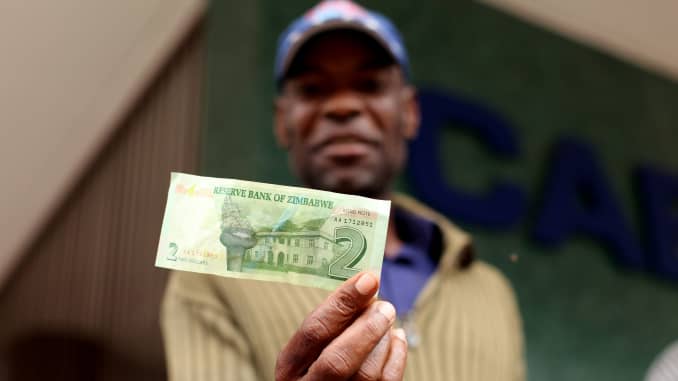- President Emmerson Mnangagwa last week made a plea for international funding.
- Mnangagwa’s government was elected to office in July 2018 after a military coup d’état in November 2017 ousted long-time dictator Robert Mugabe.
- Zimbabwe continues to struggle to access external official support on account of its problematic debt profile.

Zimbabwe is facing an “economic and humanitarian crisis” amid a lethal cocktail of macroeconomic instability, climate shocks and policy missteps, according to the International Monetary Fund (IMF).
The southern African nation’s economy is expected to have contracted by 7.5% in 2019, according to the World Bank, with extreme poverty rising to 34%, or 5.7 million people, and the country is facing its worst hunger crisis in a decade.
Inflation was running at more than 500% at the end of last year, the newly introduced Zimbabwean dollar (ZWL$) has lost most of its value, and climate shocks have crippled Zimbabwe’s agriculture and electricity generation, rendering more than half of the population food insecure.
President Emmerson Mnangagwa last week made a plea for international funding, with Zimbabwe’s outstanding foreign debts of $8 billion having isolated the country from additional loans from the IMF, World Bank, African Development Bank and the Paris Club.
Mnangagwa’s government, elected to office in July 2018 after a military coup d’état in November 2017 ousted long-time dictator Robert Mugabe, adopted an agenda focused on macroeconomic stabilization and reforms which were supported by an IMF staff monitored program, adopted last May.
“Major shifts in policy have followed Robert Mugabe’s ouster, but the government has very little to show for these changes,” Jee-A van der Linde, an economist at NKC African Economics, said in a note Monday.
These reforms included a fiscal consolidation aimed at reducing monetary financing of the deficit, the reintroduction of the domestic currency in February 2019, and the restructuring of the command agriculture financing model to a public-private partnership with commercial banks.
IMF program ‘off-track’
Following a visit to Zimbabwe last week, IMF officials highlighted that the program is now “off-track” due to inconsistent policy implementation, notably delays and “missteps” in foreign exchange and monetary reforms.
Meanwhile, Zimbabwe continues to struggle to access external official support on account of its problematic debt profile.
“The Zimbabwean government has yet to define the modalities and financing to clear arrears to the World Bank and other multilateral institutions, and to undertake reforms that would facilitate resolution of arrears with bilateral creditors,” IMF said following its consultation last week.
Zimbabwean authorities are therefore forced to walk a tightrope between tight monetary policy, to reduce sky-high inflation, and prudent fiscal policy to address the macroeconomic imbalances and shore up the currency, all while averting a crisis, the IMF report highlighted.
“While the 2020 budget includes a significant increase in social spending, it is likely insufficient to meet the pressing social needs. Absent a scaling up of donor support, the risks of a deep humanitarian crisis are high,” IMF officials concluded.
Political stability risk
Van der Linde agreed, suggesting that while the Treasury in its 2020 budget was compelled to set aside substantial funds for social spending, this will likely be “insufficient to address Zimbabwe’s growing social needs.”
IMF executive directors issued a series of recommendations requiring urgent attention, including urging a concerted effort from the Zimbabwean authorities to coordinate fiscal, monetary and foreign exchange policies, along with implementing non-essential spending cuts and agricultural support reforms and enhancing central bank independence and transparency.
Directors also stressed the need for the government to address “governance and corruption challenges, entrenched vested interests, and enforcement of the rule of law” in order to improve the business climate.
However, with the IMF staff monitored program off course, van der Linde suggested that 2020 could only be “extremely testing” for the government, the Zimbabwean people, businesses and investment prospects.
“From our perspective, there is little prospect of a major improvement to Zimbabwe’s economic and financial challenges in the short- to medium term and the measures in place designed to improve prospects are likely to have negative social consequences, with some risk to political instability,” he concluded.


